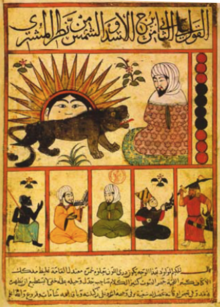阿布·马谢尔
阿布·馬謝爾·巴爾基(أبو معشر جعفر بن محمد بن عمر البلخي,787年8月10日—886年3月9日[3])是一名早期波斯[4][5][6]穆斯林占星家,被認為是巴格達阿拔斯王朝宮廷中最偉大的占星家[1]。雖然他不是一個主要的創新者,但他培訓占星家的實用手冊深刻地影響了穆斯林的思想史,並透過翻譯影響西歐和拜占庭的思想史[3]。
| 阿布·馬謝爾 | |
|---|---|
 15世紀《生辰記》手稿的頁面 | |
| 出生 | 787年8月10日 大呼羅珊巴爾赫[2] |
| 逝世 | 886年3月9日(98歲) 阿拔斯帝國伊拉克瓦西特 |
| 學術背景 | |
| 受影響自 | 亞里斯多德、托勒密 |
| 學術工作 | |
| 年代 | 伊斯蘭黃金時代 |
| 主要領域 | 占星術、天文學 |
| 施影响于 | 西傑茲 艾爾伯圖斯·麥格努斯 羅傑·培根 皮埃爾·戴伊 皮科·德拉·米蘭多拉[1] |
參考資料
编辑- ^ 1.0 1.1 Yamamoto 2007.
- ^ The Arrival of the Pagan Philosophers in the North:A Twelfth Century Florilegium in Edinburgh University Library, Charles Burnett, Knowledge, Discipline and Power in the Middle Ages, ed. Joseph Canning, Edmund J. King, Martial Staub, (Brill, 2011), 83;"...prolific writer Abu Ma'shar Ja'far ibn Muhammad ibn 'Umar al-Balkhi, who was born in Khurasan in 787 A.D. and died in Wasit in Iraq in 886..."
- ^ 3.0 3.1 Pingree 1970.
- ^ Frye, R.N. (编). The Cambridge history of Iran, Volume 4 Repr. London: Cambridge U.P. 1975: 584. ISBN 978-0-521-20093-6.
We can single out for brief consideration only two of the many Persians whose contributions were of great importance in the development of Islamic sciences in those days. Abu Ma‘shar al-Balkhi (d. 272/886), who came from eastern Iran, was a rather famous astrologer and astronomer.
- ^ Hockey, Thomas. Biographical encyclopedia of astronomers. New York: Springer. 2014: 91. ISBN 9781441999184.
The introduction of Aristotelian material was accompanied by the translation of major astrological texts, particularly Claudius Ptolemy's Tetrabiblos (1138), the pseudo-Ptolemaic Centiloquium (1136), and the Maius Introductorium (1140), the major introduction to astrology composed by the Persian astrologer Abu Ma‘shar.
- ^ Selin, Helaine. Encyclopaedia of the history of science, technology, and medicine in non-western cultures . Berlin New York: Springer. 2008: 12. ISBN 9781402049606.
Since he was of Persian (Afghan) origin...
外部連結
编辑- Abu Ma'shar al-Balkhi (页面存档备份,存于互联网档案馆) at the Encyclopedia Iranica